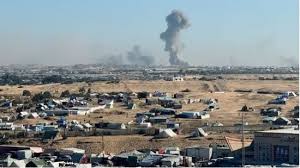An Israeli official cautioned Wednesday that the war in Gaza might persist until the year’s end, casting doubt on hopes that the fighting would cease after the military operation against Hamas in Rafah.
Tzachi Hanegbi, Israel’s national security adviser, indicated that 2024 had been designated a “year of combat” by Israel’s war cabinet.
“We are now in the fifth month of 2024, which means we expect another seven months of fighting to deepen our achievements and achieve our goal of destroying the military and governmental capabilities of Hamas and Islamic Jihad,” Hanegbi stated.
These remarks come as Israeli tanks, spotted in central Rafah for the first time since the operation commenced, continued to advance on the southern Gaza city on Wednesday.
This action persists despite mounting global pressure to halt the offensive, as reported by CNN.
Initially, the Israeli government suggested that entering Rafah would mark the final stage of its war against Hamas, which initiated attacks on Israel in October, resulting in approximately 1,200 casualties and the abduction of around 250 individuals.
In response, Israel launched a devastating offensive in Gaza, claiming the lives of over 36,000 people, according to Palestinian officials.
Despite earlier considerations for a ceasefire-for-hostages deal with Hamas, the more hawkish faction of Israel’s war cabinet advocated for proceeding with the Rafah offensive, prioritizing the destruction of the group over the return of hostages believed to be in Gaza.
Hanegbi’s statements imply that the Rafah operation may not signify the conclusion of hostilities, raising questions about Prime Minister Benjamin Netanyahu’s plans to de-escalate Israel’s campaign and establish post-war governance in Gaza.
While Netanyahu has portrayed Rafah as Hamas’ “last bastion,” Israeli forces have been active in northern areas where the military previously claimed to have dismantled militant command structures.
During a radio interview on the Israeli station Reshet Bet, Hanegbi emphasised, “It was honestly stated in the first days of presenting the plans to the cabinet that the war would be long.”
He urged patience and resilience, cautioning against setting ultimatums, according to CNN.
Meanwhile, Israel persists with its military offensive despite growing global outrage, triggered by an Israeli airstrike on Sunday that killed at least 45 people and injured 200 others in Rafah at a camp for displaced people, previously designated as a safe zone.
Footage from the Tal al-Sultan camp depicted scenes of horror, with charred bodies extracted from rubble and a man holding the headless body of a child amidst raging fires.
Despite calls for reconsideration, US President Joe Biden has maintained his stance on Israel, indicating that the Rafah strike had not yet crossed a red line warranting alterations in American support.
The strike occurred shortly after the International Court of Justice (ICJ) ordered Israel to “immediately halt” its offensive in Rafah or any actions exacerbating conditions for Palestinians in Gaza.
The ICJ described the humanitarian situation in Rafah as “disastrous,” warning of further deterioration if Israel’s operation persists, CNN reported.





